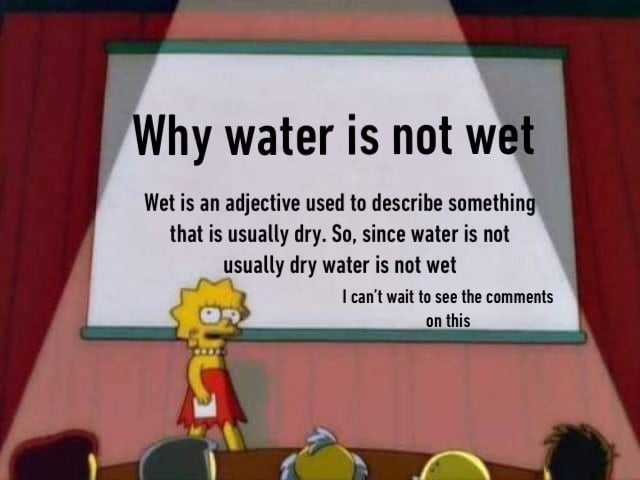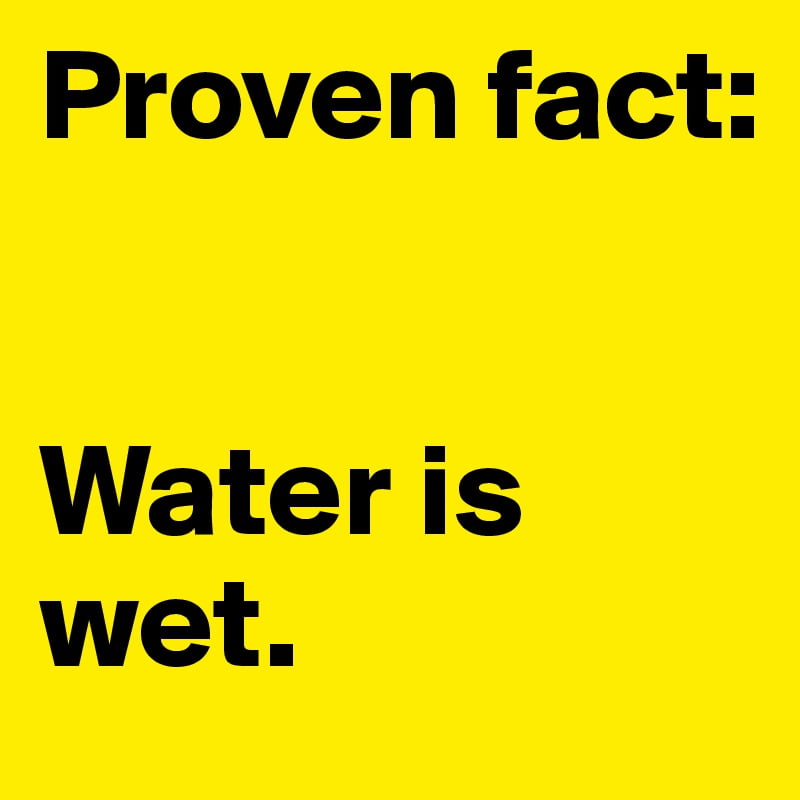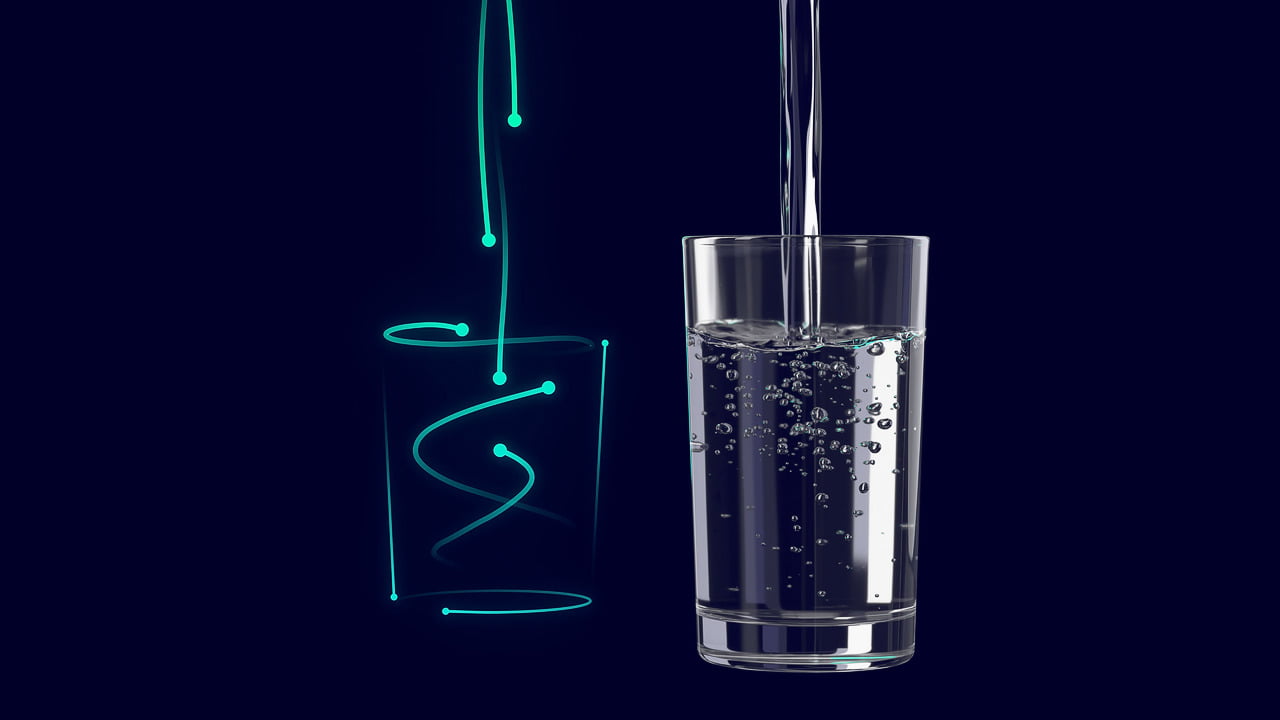The question of whether water is wet dances between philosophy and science. This strange topic has always fascinated those interested in the fundamental nature of substances. To understand this debate, we’ll need to unpack all the layers of reasoning that surround it. Not only the rational reasons but also the esoteric ones. Let’s dive deeply into this complex debate and try to figure out why something so simple remains such a mystery; if it even is a mystery at all.
What is Wet?
Wet describes the state of being soaked or immersed in a liquid. It’s also used to describe objects that are damp or moist. It can be easy to overlook, but it’s one of those things that lays a strong foundation for understanding water itself and what being wet actually is.
In an everyday conversation with people around the world, we often call something wet when it’s surrounded by a liquid. There was once a time when I really had to think about this because I remember asking myself if the water was wet. This interpretation is pretty much in line with major dictionary definitions like Merriam-Webster and the Oxford English Dictionary. Both of them define “wet” as the state of a surface or object being soaked or overloaded with any kind of liquid, but more commonly water.
When you use this word, you’re talking about an object that has water on it, either on top or absorbed into it. Another way for something to become wet that we don’t think about too often is through condensation. This happens when the atmosphere cools down vapors from water and they turn into actual droplets.
Is Water Wet?
Is water wet? We all know that it’s a liquid, but the debate over whether or not it is actually wet has been around for centuries. Like many things in life, there isn’t one definitive answer. It all comes down to how you define the concept of “wetness.”
If you define wetness as the presence of liquid on a surface, then water is wet. But if you define it as the sensation of being covered in a liquid, then water is not wet. Because water doesn’t feel wet to itself.
Another way to think about it is with objects that are commonly seen as wet by us humans. A sponge feels wet when it’s soaked with water, but a fish that lives in the stuff isn’t considered wet because it’s always surrounded by it. So if we go off this definition of what being wet really is, then no, water is not wet.
Ultimately, whether or not you think water is wet comes down to your personal definition. There isn’t one single answer that can be wrong or right.
Water Isn’t Wet: Why Do People Ask?
The concept that water itself isn’t wet is often easier to grasp through illustrative examples rather than abstract explanations. Explore some analogies that convincingly demonstrate why water isn’t, and can’t be, considered wet.
Heat: When you touch something hot, you feel heat. But the item never is heated itself. Similar to when you come in contact with water and feel wetness, but the water isn’t wet.
Fire: Fire can burn things, but the fire itself isn’t burnt. Water can make objects wet, but it’s distinct from wetness.
Color: Picture a blue ball. It has “blueness,” but we would never call blue a ball. The ball represents an object with the color blue, and this is how water has wetness.
Electricity: A battery gives us electricity to power devices, but doesn’t become electricity itself. It merely stores electrical energy and can transfer it to other objects to enable their functionality. However, this doesn’t render water itself as wet, just as a battery is not electricity.
Light: Think of a flashlight. It can emit light, but the flashlight itself is not “light.” Similarly, water can render objects wet, yet water itself does not assume the quality of wetness.
Is a flashlight light the same as a flashlight? Of course not. Water is not wet for the same reason!
A Fresh Perspective on Why Water Isn’t Wet

To better grasp the concept that water is not wet, let’s explore it from a different perspective. Water is fundamentally a substance – specifically, a liquid. Conversely, wetness is an attribute or quality experienced by something or someone. It is a characteristic associated with nouns but does not stand alone as a noun itself.
When water touches an object, it can make that object wet. However, water itself is not inherently wet. It is still just water in its fundamental form.
Digging deeper, wetness is something we can sense and feel. We’ve all experienced the sensation of being wet when touching a damp towel or walking through a puddle. Water has the property of wetness, which allows it to transfer that quality to other objects. However, it’s important to note that just because water has the quality of wetness doesn’t mean that water itself is inherently wet.
As a reminder, let’s consider the flashlight analogy that was mentioned earlier. Though a flashlight does produce light, it is not inherently “light” itself. Similarly, while a battery can supply electricity to power various devices, it cannot be equated with “electricity.”
The Myth: Why is Water Wet?
While the notion that water isn’t wet is a prevailing perspective, some argue in favor of water being wet when you base the definition on the sensation or experience of having water or another liquid on a surface. Here’s a counterargument that delves into why water might be considered wet under certain conditions.
Water is potentially wet, defined as the sensation or experience of having water on a surface. It could be argued that water is wet based on this interpretation. Unique behavior is exhibited by water molecules, which generate a cohesive force due to hydrogen bonding. That cohesive force can produce the feeling of wetness.
Surrounded by water in an ocean or pool, you’ll find yourself immersed. Being fully encompassed by the liquid makes it hard to argue that water isn’t wet, since it’s what creates the feeling of being wet.
What Experts and Others Are Saying About Water is Wet.
The UCSB ScienceLine, a reputable source crewed by scientists at the University of California, Santa Barbara, asserts that “liquid water is not itself wet but can make other solid materials wet.” According to their explanation, the interaction of water molecules results in adhesive and cohesive forces, which, in turn, give rise to surface tension. These forces are initiated by the hydrogen bonds formed between hydrogen and oxygen atoms in water molecules. When water molecules encounter a surface, these forces contribute to the condition of a surface becoming wet.

For those with a penchant for scientific detail, UCSB suggests that a drop of water can effectively wet a surface because of its liquid nature, allowing it to create adhesive and cohesive forces. These water molecules collaborate to form hydrogen bonds, enabling interaction with various material surfaces, whether they are hydrophobic or not.
Is Water Wet? The Science Behind the Sensation
The question of whether water is wet has intrigued people for ages. To understand the concept of wetness in the context of water, we need to delve into the fascinating world of science and human perception.
#1. The Sensation of Wetness
Any fluid can be described as wet when the sensation of wetness results from its movement over the skin. However, have you ever noticed that when you hold your hand perfectly still while submerged, you don’t feel wet? Or that a single drop of water on your skin doesn’t elicit a sensation of wetness? These questions challenge our perception of water’s wetness.
#2. The Role of Surface Tension
Laurie Hollings, who dabbles in photography for fun, offers a solution to the questions posed. She suggests the utilization of a “wetting agent” in the latter stages of film development. The addition of this substance guarantees the even drainage of water and prevents unsightly drying marks. This observation underscores the idea that the concept of wetness can be subjective based on the particular surface and material in question, revealing the contextual nature of water’s wetness.
#3. The Chemistry of Water’s Wetness
Ian Flintoff and C. A. Mitchell provide contrasting views on the chemistry behind water’s wetness. While Flintoff emphasizes the role of charged hydroxyls and hydrogen ions in creating a clinging effect, Mitchell highlights the polar nature of water molecules and how they interact with other substances to produce wetness.
#4. Surface Tension
The discussion then moves to the concept of surface tension, introduced by John Geake. Water’s ability to stick to itself and other substances due to its polarity is a significant factor in understanding its wetness. The high latent heat of vaporization, which causes cooling through evaporation, also contributes to the sensation of wetness when water comes into contact with the skin.
#5. A Philosophical Take on Wetness
W.C. Dutton introduces a philosophical dimension to the discussion, emphasizing that the definition of wetness relies on individual opinion and interpretation of the available scientific evidence. The debate about whether water is wet becomes a matter of perception.
#6. The Role of Human Sensation
Ewan Sweeney and Dr. John Martin delve into the human sensory experience. They explain how various factors, including temperature, pH, and molecular polarity, contribute to the sensation of wetness when water touches the skin.
#7. The Role of Viscosity and Surface Tension
Peter Twot and Steve West discuss the physical properties of water, highlighting its viscosity and surface tension as key factors in understanding why water feels wet when it touches the skin.
#8. Human Perception and the Term “Wet”
Teddy McD and Prince Dave offer simple yet profound insights into the notion of wetness. They emphasize that water is considered wet because that’s how we, as humans, perceive it.
Conclusion
In the quest to answer the age-old question, “Is water wet?” we have embarked on a fascinating journey through science, philosophy, perception, and language. The myriad perspectives offered by experts, scholars, and curious minds have unveiled the intricate and multifaceted nature of this debate.
We’ve explored the concept of wetness as a sensation, a function of moisture content, a marketing ploy, and even as an outcome of chemical interactions. From the polar molecules and surface tension to cohesive and adhesive forces, we’ve delved deep into the science of water’s wetness.
Yet, as we navigate through the various explanations and theories, it becomes evident that the answer isn’t as straightforward as we might wish. The question of whether water is wet can be seen as both a scientific inquiry and a philosophical conundrum. It embodies the human propensity to label, describe, and understand our experiences.
So, as you ponder this question in your daily life or engage in discussions with others, remember that the answer may be as fluid as the water itself, allowing for a range of interpretations and perspectives. It’s not just a question; it’s an exploration of our capacity for wonder, our desire for understanding, and the boundless nature of our inquisitive minds.











